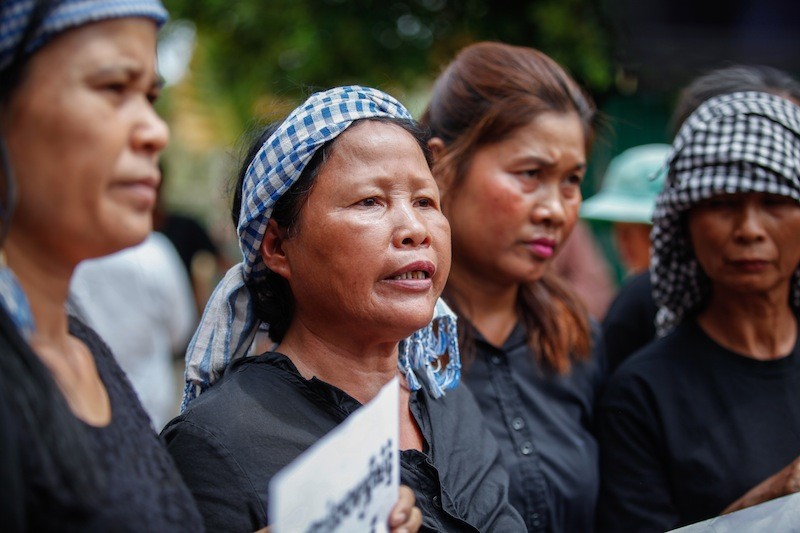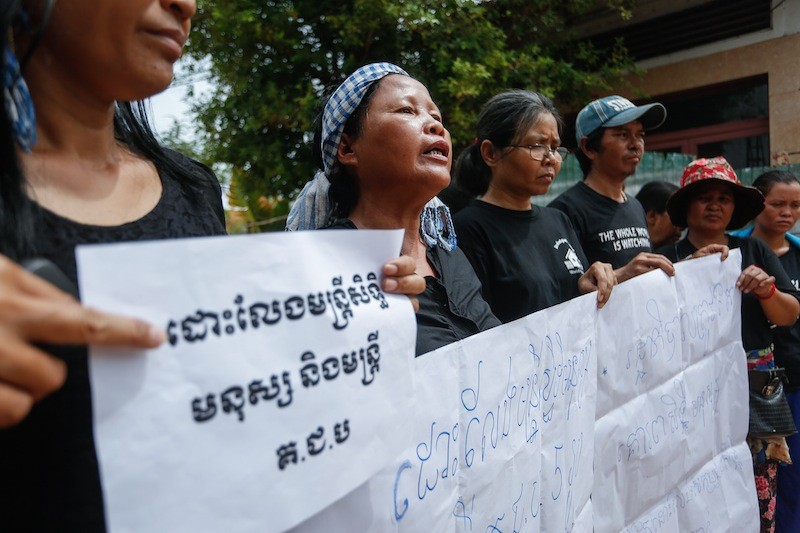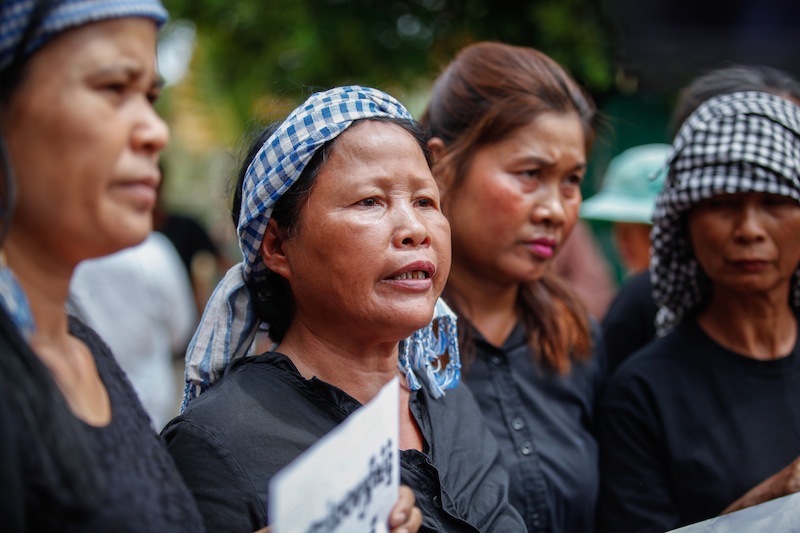It wasn’t until the sun set on the third “Black Monday” on Monday that activists calling for the release of a group of jailed human rights officers again scuffled with state security guards, after the guards descended on a candlelight vigil being held in Phnom Penh’s Boeng Kak neighborhood.
At about 6 p.m., dozens of security guards descended upon a group of about 30 activists as they began a ceremony calling for the release of four officers for local rights group Adhoc and an election official jailed for their alleged role in bribing a woman involved in a sex scandal.

In a video of the incident, Daun Penh district guards can be seen tearing apart banners and tossing away lotus flowers and candles as they break up the vigil.
“We rallied to mourn human rights in our community this evening, but dozens of security guards came to destroy our ceremony,” said Tep Vanny, a prominent land rights activist and a leader in the Boeng Kak community.
“I think they seriously violated our rights, and we think the human rights situation in Cambodia now is zero,” she said.
Deputy municipal governor Khuong Sreng declined to comment on the altercation, while City Hall spokesman Mean Chanyada could not be reached.
The day began in a decidedly more peaceful manner, with a lone group of activists—some arrested during the past two Black Monday protests—gathering at about 9 a.m. for a demonstration in an alleyway in Pur Senchey district, as about 20 police sat in a cafe around the corner.
The activists were equally negative about the state of human rights in the country, however, amid a wave of arrests and legal action against government critics in recent months.
“The Pol Pot regime killed the people by hitting them with hoes but the present government kills people through violating human rights and land grabbing,” shouted activist Chray Nim, who was arrested and released last week.
“If Samdech Prime Minister [Hun Sen] continues to persecute the people and arrests civil society officials to put them in jail, it will make the CPP vote become zero,” said protester Ngov Nary, who was also arrested last week.
Senior government officials have made various threats against the black-clad protesters, calling such demonstrations acts of “urban rebellion,” pledging that any protests held without permission will result in legal action, and even warning people not to take the campaign online.
Contacted on Monday afternoon, national police spokesman Kirth Chantharith said he believed the Black Monday protesters were attempting to “test” the government.
“First, they test how their power is against the government, which is easy to recognize when they wear black,” General Chantharith said. “Second, they want to test the authorities to see what we will do, what we will do wrong to attract support from the people.”

The police spokesman said the protesters in Pur Senchey’s Thmal Koul neighborhood were left alone because they kept their protests close to home.
“They rallied at their houses, so we did not want to catch them. We respect the law, we respect our professional principles. We cannot do it in a disorderly way,” he said.
While there were few protesters out on the streets, the online campaign appeared to gain momentum as Cambodians at home and abroad posted pictures of themselves in black clothing under the hashtag #BlackMonday.
Maina Kiai, the U.N.’s special rapporteur on rights to freedom of peaceful assembly and of association, posted a picture of himself meeting Naly Pilorge, director of rights group Licadho, and Ee Sarom, executive director of housing rights group Sahmakum Teang Tnaut, both wearing black at the Oslo Freedom Forum in Norway.
Though the government has succeeded in scaring most activists away from protesting on the street, political analyst Ou Virak said the efforts would not curb public frustration.
“They’ve succeeded in intimidating and getting people off the street and stopping the protests. One of the things I don’t think they’ve succeeded in is to stop the continued discontent of the Cambodian public,” Mr. Virak said.
“If you don’t understand the will of the people, protests are actually one form of getting that message,” he said, adding that banning protests could create a “gap of understanding” between the government and citizens.
“That could be dangerous,” he said.




